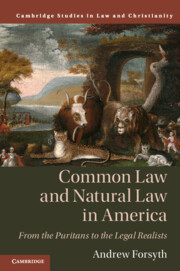Book contents
- Common Law and Natural Law in America
- Law and Christianity
- Common Law and Natural Law in America
- Copyright page
- Dedication
- Contents
- Preface
- Acknowledgments
- 1 Puritan Natural Law
- 2 Modern Natural Law
- 3 Organizing Common Law
- 4 Subsuming Natural Law into Common Law
- 5 Law as Science
- 6 Breaking with Natural Law
- Epilogue
- Index
2 - Modern Natural Law
Revolutionaries and Republicans
Published online by Cambridge University Press: 05 April 2019
- Common Law and Natural Law in America
- Law and Christianity
- Common Law and Natural Law in America
- Copyright page
- Dedication
- Contents
- Preface
- Acknowledgments
- 1 Puritan Natural Law
- 2 Modern Natural Law
- 3 Organizing Common Law
- 4 Subsuming Natural Law into Common Law
- 5 Law as Science
- 6 Breaking with Natural Law
- Epilogue
- Index
Summary
- Type
- Chapter
- Information
- Common Law and Natural Law in AmericaFrom the Puritans to the Legal Realists, pp. 24 - 45Publisher: Cambridge University PressPrint publication year: 2019



